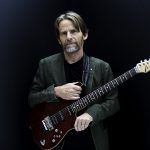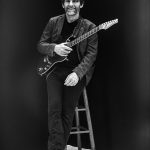“Mackey’s sonic imagination is coupled with a deep mastery of craft” – The Boston Globe
“My entire life was changed by a single note.” As a teenager growing up in Northern California obsessed with blues-rock guitar, Steven Mackey was in search of the “right wrong notes,” as he often likes to say, referencing Thelonius Monk. The single note in question occurs in the second movement of Beethoven’s last string quartet, which a 19-year-old Mackey heard while driving around northern California: an unexpected unison E-flat that wielded the power to explode assumptions he had about classical music. He would later describe it as the most psychedelic rock music he’d ever heard.
Mackey cites this as the moment he decided to become a composer, and it set the young guitarist on a path that has defined his music to this day: Colorful notes (including blue) creating vivid topographies that serve as landmarks on fantastical journeys.
Today, Steven Mackey is a GRAMMY-winning composer of works for chamber ensemble, orchestra, dance, and opera—commissioned by the greatest orchestras around the world, and winner of several awards from the American Academy of Arts and Letters, a Guggenheim Fellowship, and a Kennedy Center Friedheim Award. Bright in coloring, ecstatic in inventiveness, lively and profound, Mackey’s music spins the tendrils of his improvisatory riffs into large-scale works of grooving, dramatic coherence.
Mackey began composition studies at the University of California at Davis and received his PhD at Brandeis University. Upon graduating and becoming a professor at Princeton, Mackey came to realize his true creative voice by merging his academic training with the free-spirited physicality of his mother-tongue rock guitar music. Signature pieces incorporating rock vernacular into traditional classical ensembles emerged: Troubadour Songs (1991) for string quartet and electric guitar; Physical Property (1992) for electric guitar and string quartet; and Banana/Dump Truck (1995), a concerto for solo electrified cello plus a ripieno group of cellists and orchestra.
The decades that followed saw Mackey create many of the defining pieces in his repertoire: Dreamhouse (2003) for solo tenor, vocal quartet, electric guitar quartet and orchestra, nominated for four GRAMMY awards; A Beautiful Passing (2008) for violin and orchestra, an emotional reflection upon the death of his mother that Leila Josefowicz premiered with the BBC Philharmonic; and Slide (2011), an experimental music theater piece that won a GRAMMY Award for a recording featuring Mackey on electric guitar alongside vocalist Rinde Eckert and eighth blackbird. In 2021, the LA Phil, Gustavo Dudamel, and trumpet soloist Thomas Hooten gave the world premiere of Shivaree, a fantasy for trumpet and orchestra. Mackey further expanded his theatrical catalog with his short chamber opera Moon Tea about the 1969 meeting between the Apollo 11 astronauts and the Royal Family, premiered by Opera Theatre of Saint Louis in 2021, as well as with his 2022 music theater work Memoir, based on the pages of his late mother’s memoirs.
This season sees three world premieres: Concerto for Curved Space with the Boston Orchestra and Andris Nelsons; Red Wood, a new environmentally concerned work for The Soraya’s Treelogy Project; and RIOT with mezzo-soprano Alicia Olatuja, Mackey on electric guitar, New Jersey Symphony, Princeton University Glee Club, and conductor Xian Zhang.
Today, Mackey lives in Princeton, New Jersey with his wife, composer Sarah Kirkland Snider, and their son Jasper and daughter Dylan, and teaches at Princeton University, where he mentors young composers as director of the Edward T. Cone Composition Institute. In fall 2022, Mackey also joins the composition faculty at the Curtis Institute of Music. He continues to explore an ever-widening world of timbres befitting a complex, 21st-century culture, while always striving to make music that unites the head and heart, that is visceral, that gets us moving.
Photo Credit: Kah Poon





